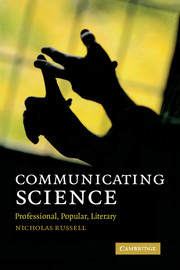Book contents
- Frontmatter
- Contents
- Introduction: What this book is about and why you might want to read it
- Prologue: Three orphans share a common paternity: professional science communication, popular journalism and literary fiction are not as separate as they seem
- Part I Professional science communication
- 1 Spreading the word: problems with publishing professional science
- 2 Walk like an Egyptian: the alien feeling of professional science writing
- 3 The future's bright? Professional science communication in the age of the internet
- 4 Counting the horse's teeth: professional standards in science's barter economy
- 5 Separating the wheat from the chaff: peer review on trial
- Part II Science for the public: what science do people need and how might they get it?
- Part III Popular science communication: the press and broadcasting
- Part IV The origins of science in cultural context: five historic dramas
- Part V Science in literature
- Index
- References
2 - Walk like an Egyptian: the alien feeling of professional science writing
Published online by Cambridge University Press: 02 December 2010
- Frontmatter
- Contents
- Introduction: What this book is about and why you might want to read it
- Prologue: Three orphans share a common paternity: professional science communication, popular journalism and literary fiction are not as separate as they seem
- Part I Professional science communication
- 1 Spreading the word: problems with publishing professional science
- 2 Walk like an Egyptian: the alien feeling of professional science writing
- 3 The future's bright? Professional science communication in the age of the internet
- 4 Counting the horse's teeth: professional standards in science's barter economy
- 5 Separating the wheat from the chaff: peer review on trial
- Part II Science for the public: what science do people need and how might they get it?
- Part III Popular science communication: the press and broadcasting
- Part IV The origins of science in cultural context: five historic dramas
- Part V Science in literature
- Index
- References
Summary
Vernon, cowman, awkward in his washed-out boiler suit, goes forth from the cottage across the starlit yard to the hulk of the milking parlour. He can hear the cows fretting at the entrance as he throws the switches and the neon strips falter to life and the main pump hums up. Ten minutes later he opens the doors to his charges who stumble through to the relief of the milking stalls.
“Steady, steady, g'on, g'on, lummox, lummox, move over you lummox – steady now,” restraining, directing beasts to stalls, “come on girl, come on”, to a misdirected enthusiast then, “back, back, that's right my girl, that's right”, in another adjustment of cow to stall, “g'on beauties, g'on,” as the first eight fill the herringbone and sense the clamp of Vernon's suction caps, their damp breath clouding in the dawn air.
And so on, Vernon cajoling his cows through the two hour milking until they are all clomping back across the field towards the hay strewn in the upper pasture. The children have already left for school when he sits down for breakfast, idly scanning the paper.
“Well, Elizabeth, have you seen this?”
“What love?” replies his wife.
“Well I never did – says here,” and Vernon scans the line with his finger, “Scientists at the National Dairy Laboratory have been working on a new way to make antibiotics and are forming a private company to develop their pioneering work. Herds of cows will produce milk containing antibiotic. […]
- Type
- Chapter
- Information
- Communicating ScienceProfessional, Popular, Literary, pp. 16 - 27Publisher: Cambridge University PressPrint publication year: 2009



